Barbara Rainey's Blog, page 2
March 31, 2025
Resurrection Cards: Learning About the Intricately Orchestrated Pinnacle of Human History
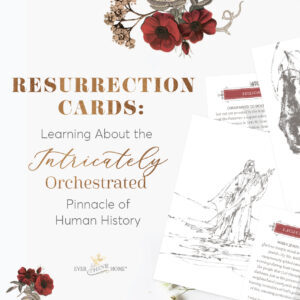
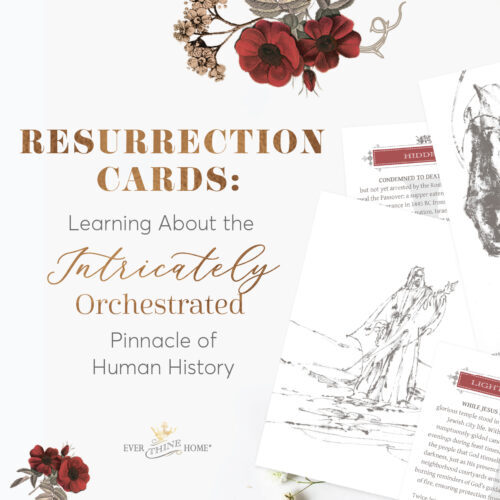
Did you know Jesus never asked us to celebrate His birthday? But we do … lavishly and extravagantly. But if we have Christmas and Easter out of proportion in our world, and we do, how can we elevate Easter this year? How do we balance our celebrations of these two world-changing events?
Today we’ll look at some important details surrounding the first Easter, followed by an easy but profoundly meaningful way to bring this story to life for yourself and your whole family.
For starters we must remember that Jesus, His parents, siblings, disciples, and friends were all Jewish. Like a warm current in the cold ocean, the people of Israel, Jesus’s people, moved to a centuries-old pattern of life no matter where they lived. This annual ebb and flow was founded upon seven festivals—three in early spring, one in early summer, and three in autumn—given by God as special occasions to remember Him and to celebrate His goodness to them.
Like Christmas Eve, Christmas Day and New Years Day, Jewish festivals were holidays that anchored their annual calendars as these holidays do for us. But one of the important differences in their holidays was the offering of sacrifices during some of the festivals. The whole purpose of the sacrificial system provided a way for the people to apologize or repent for their offenses toward God, also called sin. When offered with genuine humility, sacrifices kept their hearts in sync with His and free from the undertow of sin.
Very, very importantly, in the year of Christ’s crucifixion and Resurrection, the Jewish springtime feasts of Passover, Unleavened Bread, and First Fruits were, by God’s divine plan, timed precisely to occur consecutively on Friday, Saturday, and Sunday. These three festival days changed every year, much like the date of Easter changes for us each year.
A couple of other important details that add great meaning and mystery to our understanding of Easter: Jewish days ended and began anew at sundown, not midnight; and the Jewish Sabbath day is always a Saturday, not Sunday. Therefore, in 33 A.D, Jesus died on the cross on a Friday which was Passover that year; as the sun set Saturday the Sabbath began was that year the first day of Unleavened Bread; and Sunday’s dawn revealed Christ’s Resurrection. This explains the verse that says, “Christ has been raised from the dead, the firstfruits of those who have fallen asleep” (1 Corinthians 15:20). And there is so much more …

Jesus said repeatedly that He always pleased His Father. As a Jewish man, He was expected to keep the religious laws, feasts, and celebrations that had been in place since the time of Moses. And Jesus wanted to keep them because they were all clues about His true identity. Unknown to His kin, every God-directed detail of the feasts, the temples service, the sacrifices—even the temple floor plan—revealed hints to His true nature as the Messiah.
Every breath of Jesus’ life was lived to precisely fulfill the law and prophets and to perfectly obey the Father, including His keeping of the Jewish feast and festivals.
This spring, will you join me in elevating Easter? Will you ask the Spirit to open your eyes to see with fresh wonder? Will you make an investment of time and money toward this holiest of days? Truly learning, meditating, and worshiping Jesus for what He endured for us will change you just as it did the disciples who participated live in the first Easter.
This year we’re offering one of my all-time favorite resources that will help you and your family experience the power of Resurrection Sunday. Resurrection Day Stories: 8 Conversation Cards for Your Easter Table, are beautiful, frameable 5×7 cards. Each features a stunning drawing of a moment in the Easter story. The reverse side gives you a short story to read for devotions or out loud around a table. and it’s available through our Etsy store.
Here is the text for card number two in Resurrection Day Stories:
HIDDEN BREAD
Condemned to death from before time began, but not yet arrested by the Roman soldiers, Jesus chose as His last meal the Passover; a supper eaten annually by the Jews to remember their deliverance in 1445 B.C. from Egyptian slavery and to celebrate their beginning as a nation. In their hurried exodus from Egypt, Israelite women baked bread without leaven, or yeast, because there was no time to let it rise. Today’s flat Passover bread, matzah, is pricked with tiny holes and grilled, marking the finished bread with visible stripes and piercings. The words “pierced” and “striped” in the story of the Cross are signs of deep truth for those with eyes to see.
During the Passover supper the Jewish father breaks the matzah into three equal pieces, symbolizing the Trinity, wraps the middle portion in a white linen napkin, and hides it. The children search eagerly for the piece, which, when found and brought from its cloth, is eaten with the Cup of Redemption. At Jesus’ last supper, He explained He was the Passover Bread—without leaven (sin)—as He shared it with His disciples. The next day, His body, the Bread of Life, was broken in suffering, wrapped in linen burial cloths, and hidden in the earth. Jesus, born in Bethlehem, meaning “House of Bread,” became our buried kernel of wheat—sprouting to eternal life on Resurrection Day.
(If you have matzah, break it, then wrap and hide the middle piece for the children to find or break or other bread and eat it as you read the next story.)
There are several ways you can use these stories. Beginning on Wednesday night of Holy Week, read the eight short stories chronologically for personal meditations, concluding on Easter Sunday morning. Or read them around your Easter Day brunch or lunch (at the beginning of the meal or interspersed between courses) to marvel with family and friends at the miraculous, redemptive work of Christ. Or send them as Easter gifts to family members or friends.
Resurrection Sunday is the intricately orchestrated pinnacle of all human history! The mystery of Christ’s life and work is profound, eternal, and unfathomable. God in His love displayed astonishing signs to grow our faith and our adoration.
May you and yours elevate Easter to the place of prominence this momentous event deserves.
Visit our Etsy store to order Resurrection Day Stories: 8 Conversation Cards for Your Easter Table.
The post Resurrection Cards: Learning About the Intricately Orchestrated Pinnacle of Human History appeared first on Ever Thine Home.
February 10, 2025
Remember Your First-Love Promises?

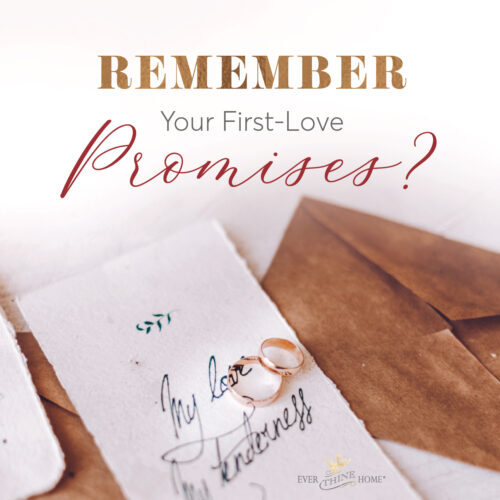
It was a warm, early summer day when Dennis invited me to go to lunch. We’d known each other as friends for three years in college, but we hadn’t seen each other in a year since graduation. So we had a lot to catch up on.
One lunch wasn’t nearly long enough. So he invited me to go on a picnic the next day. And a picnic still wasn’t enough. On the way back to my apartment, he asked me to go to church with him the next day.
And so began a month of daily dialogue—sharing rides to work, dinners, and walks after dinner. The talking never ran dry. He listened to me as it seemed no one ever had. I felt comfortable with him like no one else. Our relationship was easy and natural.
Within two months, this long conversation led to a decision to get married—a conclusion we both reached after praying for God to show us His will.
But like every married couple since Adam and Eve, we found ourselves in places where the early ease was replaced by discomfort, disagreement, or difficulty we never saw coming. The springlike oneness that was so real when we married dissipated like dew under the midsummer sun; our promises were put under fire like dry, sun-baked clay.

How do we move in marriage from the excitement of first love to a determined, mature love that lasts a lifetime? How do you move from expectant “I do” to an equally excited conviction of “We still do”?
A definition of “oneness” is a start: This is a biblical word meaning an invisible transcendent quality of perfect harmony. Why is this definition helpful? Because it is what God intends for you. Experienced perfectly by the Trinity, it is also what Jesus prayed for us! And we surely need His prayers because we married couples are not just imperfect but also incapable of achieving the oneness we married for.
How then do we recover that invisible but very real and needed quality that once lived between us? It’s not impossible. We’ve tasted oneness. The answer is going to Him, the source of what we need.
1. Ask God to reveal the truth. A heart examination is the place to start. And not your spouse’s heart. Examine your own. It is the special work of the devil to divide us. Jesus called Satan the father of lies (John 8:44), so start by asking yourself, “What lies am I listening to? What lies am I believing? Am I assuming the worst about my spouse?” It’s so easy to do. Begin by praying for eyes to see what is in your heart.
2. Ask God what has come between you if you aren’t sure. He who knows all wants you to know because His greatest desire is always reconciliation and restoration. He longs for you to say you still do.
3. Ask God to guide you to have an honest, authentic conversation with your spouse. All couples will have relational habits built over months and over decades. Recently my husband said that he hated asking me to go anywhere with him. It was an overstatement because he didn’t really mean anywhere. What he meant was going with him on ministry/business trips.
For years I had let him know how challenging these trips were for me as a mom and for my personality. I don’t enjoy small talk and networking with strangers.
But I have changed. I had a conversation with God one day and let go of my need to control, to make circumstances fit my needs. I told God I was grateful my husband wanted me to go with him at all.
I asked God to help me be positive and not negative about my husband’s desire that I always be with him. I asked God to help me enjoy every minute of this relationship. Of course I haven’t done this perfectly, but I have improved.
4. Ask God for patience with growth in oneness. The Bible calls us oak trees of righteousness (Isaiah 61:3), and oaks don’t grow overnight. You want your oneness to have the strength of an oak, not the perishable quality of a squash vine.
Trust God even when your conversation may not resolve the issue immediately but may require countless additional conversations. Remember patience is what you are practicing. You may not like those multiple conversations, but they are worth it. In God’s hands and timing, He will work the good you desire, help you both to better understand each other, and increased oneness will be the result.
As you work toward oneness in your marriage, begin where you are. Risk talking about the hard things with your spouse because when you work through these obstacles, the joy on the other side is so worth it. It’s what will allow you to enthusiastically say together “We still do!”
So pray for God to grow you together. Offer this prayer as a start:
Jesus,
We married for oneness,
companionship indivisible.
Increase my vision.
May our marriage be
all that You imagined
when you brought us together.
For Your glory and our good.
Amen.
The post Remember Your First-Love Promises? appeared first on Ever Thine Home.
February 3, 2025
Modeling Respect in Our World Today


Did your parents teach you to respect others? And I’m not just talking about respecting authority figures like teachers, the school principal, your pastor, grandparents, and other adults. Did they teach you to respect your friends, your neighbors? Did they teach you to respect people you disagree with or those who are different from you?
For parents, teaching respect often starts with helping your kids know how to respect adults. I grew up in the Midwest, in northwest Indiana, as a baby-boomer child who, along with all my peers, learned to address adults with a deference that acknowledged their greater life wisdom. Teachers were always addressed with a surname first: Mr., Miss, or Mrs. I never even knew that adults in my life had first names, except my parents’ friends Rita and Bud. Of course I never called them those names: they were still Mr. and Mrs. McFadden to my brothers and me.
Years later when Dennis and I raised our kids in the South, I taught my little ones to say, “Yes sir” and “Yes ma’am” like other parents did as a way to demonstrate honor to adults. I didn’t demand they say it all the time; I just wanted the concept to be in their vocabulary. And I’m glad I did.
But it doesn’t stop with adults. One of our jobs as a parent is teaching our kids how to love and respect any person in their lives—their siblings, their friends, the people they encounter each day. And why is this important? Because every human being in made in the image of God so therefore every person had innate value. Being in His image means you and I reflect Him by what we say and do.
Teaching children this concept isn’t easy because communicating about God isn’t easy with children, or adults for that matter. But as you teach this idea and reinforce it yourselves and as you see them respecting others as God would desire, the concept will take root and grow.
Our country lost its once understood-by-all respect for all people decades ago. The only way to change this shameful national pattern is to start at home. It will be the next generation who might influence our national moral values.
Make respect a value in your home. Teach it and practice it yourself. The conviction, “It’s not what is taught but what is caught” will mold your children for the future. As you talk in your home about political leaders, your pastor, neighbors and extended family members, be very careful that how you talk about these people your children know will impact them for life.
And remember if your children have any access to social media or news outlets they will see boasting, arrogance, rudeness, and selfishness that insists on its own way, which 1 Corinthians 13:4-5 plainly says is not becoming: “Love does not boast, is not arrogant or rude, does not insist on its own way…”
Practically, how can parents model this valuable character trait with our children when we can guarantee it’s not being taught or modeled outside of our homes?
God answers this daunting question with a simple requirement. He calls us to always love one another. John 13:34-35 says, “A new commandment I give to you, that you love one another: just as I have loved you, you also are to love one another. By this all people will know that you are my disciples, if you have love for one another.” This love then produces respect for people, even people we don’t like, don’t trust, or don’t enjoy.
February is the month we think about love because of Valentine’s Day. Looking to Jesus, who is love incarnate and the author and perfecter of our faith, we choose to imitate Him as we relate to others. Jesus respected the woman at the well who had five husbands. He talked to her and listened to her, which made her feel noticed, appreciated and valued. Her neighbors and even the disciples would have looked down on her as inferior for her serial marriages, and so would we. But Jesus wants us to show common respect for everyone just as He did.
Here are some questions to help you evaluate how you are currently modeling respect:
1. As parents are you modeling respect every day at home in your marriage? What kind of tone do you use with your spouse? Do you speak with contempt? Are you flippant or coarse or impolite? Are you arrogant or rude? Your children will copy what they see and hear.
2. Do you relate to adults in your everyday life with respect? For example, the checkout person in the grocery store, your neighbor who always parks his car too close to your driveway, or the parent of the always-in-trouble child in your daughter’s first grade classroom. What do you say that your kids hear? What kind of disrespectful facial expressions do you use that they see? Eye rolls or sighs?
3. Do you take time to respect those who aren’t like you? Do you look them in the eye, show kindness, listen if they have a story to tell? Love seeks to understand another’s point of view. Love sets aside our personal plots to understand pain in someone else’s eyes. Listen to others as individuals. And when it comes to politics, listen more to the words of Jesus than to the words of media. I find it interesting that Jesus said others will know we are His disciples by the love we show … and I’m pretty sure He wasn’t speaking just of people whose beliefs we share.
4. Do you respect your neighbors or coworkers who may not share your faith or values enough to open your home with hospitality? Jesus showed consideration and compassion, especially to those who didn’t deserve it. This is hard for us because we resist moving outside our comfort zones.
Remember how He treated a greedy, hated, thieving tax collector named Zacchaeus? Jesus ate dinner with him. In his own house. As his friend! And we know Jesus didn’t agree with Zaccheus’ life choices. He still showed honor and respect … love … to this person. And Zacchaeus was changed forever.

It’s easy to show love and respect to people who believe like you, vote like you, look like you, or dislike the same things you dislike. Real love, God’s genuine love that we are commanded to show to our hurting world, treats every person with honor and respect. Love says age doesn’t matter, gender doesn’t matter, status doesn’t matter, race doesn’t matter, theological differences don’t matter. Real love treats every person with dignity based on every individual’s innate worth as an image bearer of God.
5. To show respect in every relationship, start with what you can control. In your marriage, with your children, with your coworkers, extended family members, remember you can’t change the other person, but only yourself.
Author G.K. Chesterton was once asked, “What’s wrong with the world?” His reply was profound. He said simply, “I am.” Chesterton respected his personal depravity enough to claim his own part of the problem.
We must respect the truth of God’s Word that says we are all wicked. None of us is good on our own. Look to your own fault, your own wrong first, instead of pointing the finger in blame at someone else.
Love came to us to teach us to respect one another. Only Jesus can help you do this by the power of His Spirit who lives within believers. Ask Him to help you today.
Prayer: God help me recognize that my heart is incapable of loving as I want to love, as Jesus wants me to love. I cannot love and respect others if I think I am better than them. Being good only on the outside will never fix the problem in my heart. Amen.
P.S. I’d love to hear your story of what your parent or even a grandparent taught you about respect. I’ve always felt respect is something I can recognize easily, and disrespect in a kid I can spot a mile away, but I’ve found it difficult to describe this trait as clearly as I’d like in words. So help me out if you’d like!
The post Modeling Respect in Our World Today appeared first on Ever Thine Home.
January 20, 2025
Beyond Weight Loss: 3 New Year’s Resolutions for Your Soul


I imagine that most New Year’s resolutions are forgotten by now!
Most people who make resolutions are deadly serious when they begin. But after a few weeks, after they’ve failed a few times in cutting calories or reading the Bible daily, they give up. Well, here are some resolutions that are worth considering because they will change your life.
Resolution #1: Nurture Your Marriage
Not one New Year’s resolution list that I’ve seen has a single declaration about marriage.
Yet stable healthy marriages are the bedrock of secure societies worldwide. More important than exercise, staying hydrated, and cutting out sugar is cultivating a heart devoted to strengthening your marriage.
In all relationships Jesus is our model. Here is a simple yet impossible formula for your marriage. Simply stated resolutions:
Don’t be selfish … don’t look out only for your own interests.Do have the mind of Christ … the attitude of serving your spouse in love as Christ served us and loved us.Just reading this short list reminds me I’m a failure. You too? I have learned it is impossible for me to do these things in my own ability and power. That’s good; I finally am resigned to my inabilities.
Here is what makes the impossible possible:
Admitting I can’t change myself, much less my spouse. Selfishness is my natural inclination. “Me first” is always easier than “you first.”Understanding how to balance the command to “Let each of you look not only to his own interests, but also to the interests of others” (Philippians 2:4) is impossible for me but entirely possible for Christ in me.Having the mind of Christ is the only hope for any marriage at any season or life stage.To help you get started, pray these words: “My Jesus, thank You that nothing is impossible for You! It is Your Spirit in me that transforms my attitude, my heart, my motives, and my desires into conformity with Your example of humility in my marriage and all relationships.”

Remember: If you choose to make your marriage your number one resolution for this year, feeling incapable is a good place to be. The impossible standard of holiness God calls us to forces us to be utterly dependent on Him.
I pray you will join us in making this resolution number one on your list. And I pray you will ask the Spirit of God to make you more like Jesus in your marriage.
You’ll be glad you did.
Resolution #2: Be Still
Winter is the perfect time to begin acting on this resolution—to begin, perhaps begin again, a new habit of being still. We sang a few weeks ago, “the world in solemn stillness lay” and “all is calm, all is bright” … perfect descriptions of the quiet of winter, invitations to hush our too-busy lives in reverence for His ever-near presence.
Here are three ways to “Be still and know that I am God.”
Go for winter walks. Feel the hush of winter’s cold that sends most living things into hibernation, silencing the cacophony of summer’s sounds. Look up at the beauty of long limbs carrying hundreds of branches heavenward; each tree a maze of intricate patterns and shapes, cathedrals of wonder and worship. Recognize there the grandeur of the Creator. Be humbled by your small place in relation to Him. It is good to remember, “what is man that you are mindful of him, and the son of man that you care for him?” (Psalm 8:4).
Be still in this place.
Set an alarm on your watch or phone and, when it sounds, remember God’s faithfulness … as dependable as the clock regulated by the earth’s fixed yet constant movement, and as secure as the steadily revolving seasons. “While the earth remains … summer and winter, day and night, shall not cease” (Genesis 8:22).
Be still in this moment.
Read for your soul. Social media too often steals our peace, satisfaction, and rest. Instead feed on good books.
Choose wisely. My long-distance friend, Allison Burr, wrote, “unusual amounts of output = dire need for recharging, which is most rapidly and rewardingly accomplished through books.” If you aren’t sure what to read, anything by C.S. Lewis, Tim Keller, Madeleine L’Engle, J.R.R. Tolkien, or other classic authors will enlarge your vocabulary, challenge your thinking and feed your soul.
Be still in your heart.
“Help me Lord to make moments to be still, to order my life to receive winter’s treasures, to feed on You daily. Amen.”
Resolution #3: Embrace Your Body
“What lust is for men, comparison is for women,” said my friend Joanne. She is right.
Each year we see evidence of the perpetually ugly sin of men, even old men, lusting after women … again and again and again.
We rightly say it is evil, selfish, and often an abuse of power.
But do we women see our perpetual self-loathing, our self-comparison with every image, every friend, every woman regardless of age, as ugly? Selfish?
We do not.
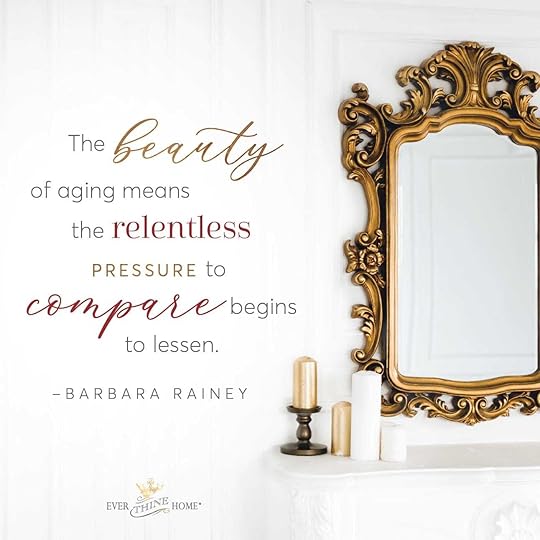
For many women, the beauty of aging means a reduction of the relentless, competitive pressure to compare ourselves to others. But while my criticisms of my body, my face, my weight, my abilities, have become less frequent and harsh, still they have not gone away.
So what do we do? Here are some suggestions:
Admit our constant comparison is an ugly sin that hurts God’s heart, rejects His love, and dulls the beauty of holiness He desires to light inside each of us.Ask God to make us aware of every single glance and thought of comparison as we walk the grocery store, church, and restaurant aisles.Speak a simple, repentant prayer every time criticism or coveting arise in your heart as you scroll through social media: “Forgive me, Lord, for thinking myself better than this woman, or less than that woman, desiring what You have not chosen to give me”Thank Him that He made you as you are for reasons He knows are best.Ask the Creator God who made you to give you His admiration and satisfaction with His intentional design.In His famous sermon on the mount, Jesus explained that adultery was not only a sin when sex was performed; He took it to the heart by saying, “But I say to you that everyone who looks at a woman with lustful intent has already committed adultery with her in his heart” (Matthew 5:28).
Number 10 on the list of commandments God wrote with His finger on stone tablets was, “You shall not covet … anything that is your neighbor’s” (Exodus 20:17). Wanting, desiring, longing for anything someone else has is a sin of the heart.
Do you desire to please God? Would you like to make Him happy? Here is how to do that in 2025: “Do not look on … appearance … stature … For the LORD sees not as man sees; man looks on the outward appearance, but the LORD looks on the heart” (1 Samuel 16:7).
Make heart change your resolution for 2025:
Nuture your marriage (reject selfishness).Be still (choose to pause and listen).Embrace your body (give thanks for His design).The post Beyond Weight Loss: 3 New Year’s Resolutions for Your Soul appeared first on Ever Thine Home.
January 13, 2025
Learning to Love Others as Jesus Loved Us

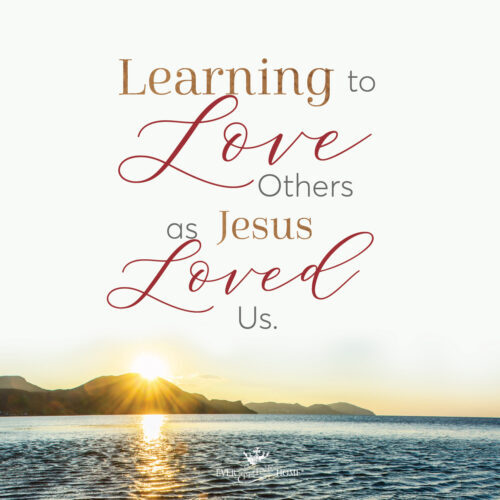
This email contains an exciting announcement that many of you have been asking about for a long time, so KEEP READING!
With Valentine’s Day coming soon, you might be surprised to know that its historical roots are not about romantic love. In fact all love originates with God who is love (1 John 4:8) and while married love is from Him too, most of us need to focus this holiday on loving one another as Jesus taught us before He went to the cross.
And perhaps it is not surprising to know that none of us loves well. Frankly, it’s just easier to be selfish. And that is the root of what’s wrong with our world.
The Bible says, “The heart is deceitful above all things, and desperately sick; who can understand it?” How about that for a cheerful Valentine thought? But it’s true. In our world we are told that to love well we need to “follow your heart.” In fact, loving well often means rejecting the feelings of your heart and, instead, allowing the Spirit of God to love others through you.
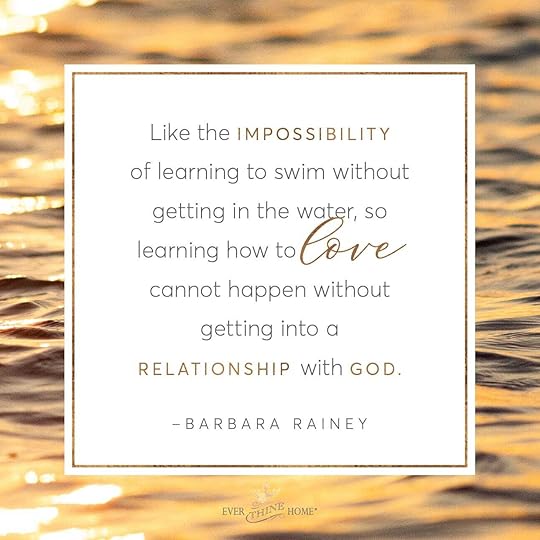
Like the impossibility of learning to swim without getting in the water, so learning how to love cannot happen without getting into a relationship with God. Thankfully, Jesus meets us in shallow waters, helping us face our fears and growing our trust in His strength. Then, if we are brave enough, He leads us to swim in the deep sea of His love.
To help you learn more about loving as Jesus loves …
Our “How Do I Love Thee” Valentine heart cards ARE BACK!!!!

In our Etsy store you will find a kit with 15 heart-shaped cards, one an introduction and then 14 cards with each of the 14 characteristics of love found in 1 Corinthians 13, the famous “love chapter” of the Bible. Twine and small clothespins are also included.
The Bible tells us God is love and Jesus said, “If you had known me, you would have known my Father also” (John 14:7). In fact, when you read the descriptors of love in 1 Corinthians 13, you can substitute Jesus’ name whenever the word “love” is written—“Jesus is patient and kind. Jesus does not envy or boast …” This is how God loves you and He asks us to love one another the same way.
Starting on February 1 read the introduction card and the card for day one with your family or alone for personal devotions. After reading it, hang the card on the twine with one of the included clothes pins. Or hang all 15 cards and remove one each day. By Valentine’s Day your family will have walked with others who have learned to love as Jesus did and have much to teach us from their example. And you will have enjoyed a lovely Valentine decoration as these pale pink cards hang across your fireplace mantel or a window.
I hope you’ll hurry to our Etsy store and get your set that can be reused every year for longer than your children will be in your home! Or buy a set for a friend who can’t afford one, or for a neighbor you want to know God. If you’re a grandparent, buy them for your grandchildren and their parents!
Make Valentines in your house about learning to love like Jesus did.
May you grow together in the wonder of being loved unconditionally by God and learn to give love generously to others!
As a bonus, here is the text from one of the cards in the “How Do I Love Thee” set:
Love Does Not Insist on Its Own Way
Love looks for and listens to the needs of others.
Love does not think about what is best for one’s self.
Love listens to the guiding whispers of the Spirit of God.
Right here near the center of the 1 Corinthians love list is the crux of our heart problem: We cannot love if we insist on our own way because selfishness always pollutes love. Only by listening to the Father, as Jesus listened, can we love purely.
To love like Jesus starts with the great commandment, “You shall love the Lord your God with all your heart and with all your soul and with all your mind … And a second is like it: You shall love your neighbor as yourself” (Matthew 22:36-40).
One day in 1957, Paul Holderfield stood with his fellow firefighters yelling hateful things at a group of African-American men who were marching for integration. Out of the crowd of marchers stepped his childhood friend Jimmy, who bravely walked up to Paul to shake his hand, but Paul refused. Later that day Paul wept because of what he’d done.
Soon afterward Paul began helping feed hungry children at a local Boy’s Club. And then he gave his life to Jesus. The change in his life was dramatic. Paul gave up bad language. He stopped drinking and smoking. And he had a new heart that loved people of all colors.
Friendly Chapel was started by Paul and his family because he wanted a church where he could live out the Golden Rule. In a neighborhood of North Little Rock, Arkansas, with the highest crime rate at the time, the fledgling church began. They opened a soup kitchen to feed the homeless, a thrift store to clothe the poor, and always lovingly welcome anyone who walked in the door.
Paul Holderfield’s greatest desire was to be a sermon seen—to show Jesus by loving his neighbor as himself.
He was a simple man who didn’t insist on his way but only on Jesus’ way. He would tell us it’s okay that we aren’t perfect, that we just have to tell God we don’t know how to love well and then get up and keep trying.
Prayer: Jesus, I cannot change my selfishness, but I can ask You to give me eyes to see my neighbor who needs Your love. Help me listen to Your voice and obey what You ask me to do. May all my thoughts be true, my love be pure, and my actions be right before You today. Amen.
The post Learning to Love Others as Jesus Loved Us appeared first on Ever Thine Home.
January 6, 2025
Living in the “Now and Not Yet”: Nurturing Expectant Faith
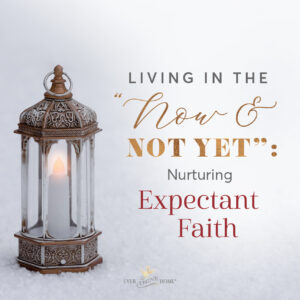
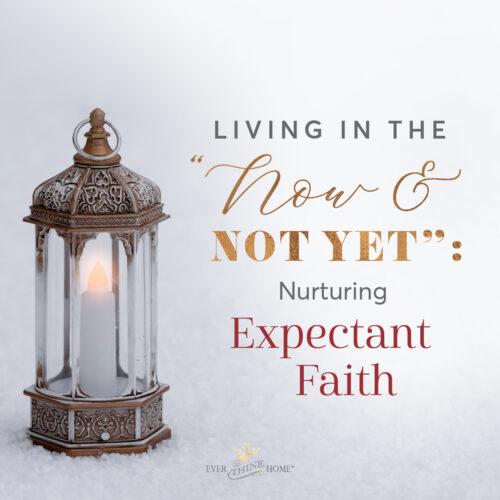
I have a friend who loves new school supplies. Perhaps it’s a carryover from her childhood … but I agree with her that it’s exciting to anticipate a new school season. Purchasing new pencils, pens, clean notebooks, paper and calendars means starting afresh. We can begin again, re-organize, enjoy the opening of a new chapter.
The start of a new year feels the same way; fresh and hopeful. Though the details of our challenges in 2025 are as yet unknown, we do know a few certainties. We know the next 12 months will bring challenges, tragedies and even disasters—more bad news about evil ruining countless lives. Yet we also know that, in the midst of these dark and ugly seasons, there will still be light—flowers will bloom, stars will shine, families will grow, churches will gather, and little children will still make us smile!
For believers in Christ there is another certainty in our future, even if it doesn’t happen in 2025. It’s not a frequent topic in our daily conversations.
But it once was.
During my college years I heard the good news of Jesus and eagerly opened my heart to Him. During the next three years most of my free time was spent in Bible studies because I was so hungry for truth. Along with a rapidly growing group of students I learned about the second coming of Jesus. His return and something called the “rapture” was all new to me, but the anticipation among us was like Christmas Eve for little kids. It was contagious and electric.
Our country was embroiled in the Vietnam War; campuses across the nation were besieged by protests and marches. At the same time, the moral standards that had seemed so stable were being undermined by the new sexual revolution. Adults felt the world was falling apart. Those who were Christians surely felt the end was near.
Jesus talked to His disciples about the end times, explaining that as we got nearer to the end of the age life would become much harder. Before He returned, evil would multiply and spread like the increasing intensity of labor pains. The darkness of sin would permeate like creeping cancer.
Jesus added a wedding parable to this conversation to further illustrate His point. The story (Matthew 25:1-13) focuses on ten virgins, bridesmaids, dressed and ready for the big procession, waiting together for the groom’s arrival. Each young woman carried an oil lamp instead of a bouquet.
This story reminds me of another wedding. On my parents’ chosen day my father and his groomsmen got lost trying to find the little country church my mother’s family attended. My grandmother was so anxious for her daughter that she chewed holes in her gloves. But my mother was completely unruffled. She knew her beloved would come. And he did.
There was a delay in Jesus’ story, too. The bridesmaids waited and waited. The sun was falling behind the hills. Darkness crept in. And then it was night. Five of the bridesmaids became so sleepy they lay down, closed their eyes, and let their oil lamps burn out. The other five, who made sure they had extra oil in case they had to wait till dawn, continued to watch.
Just after midnight the groom shouted his arrival. The five who were sleeping woke up, fumbled with their lamps and realized they had no oil left. They asked the others to give them their oil, but they would not. The decision was not selfish but wise. It was better for half to greet the groom than none.
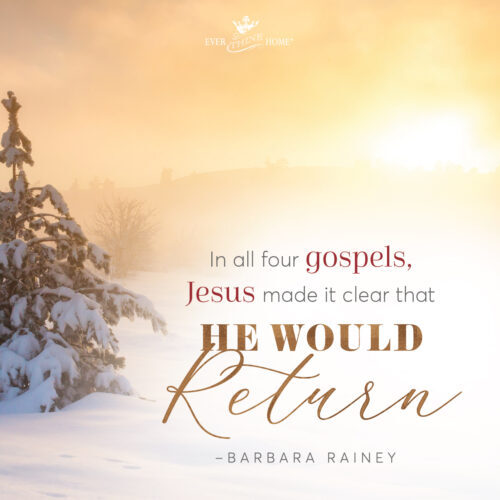
In Jewish weddings during the time of Jesus, the groom and his father sealed the proposal with the bride and her father with a toast of wine. Then the groom and his father returned home to build a little dwelling for the newlyweds on property the father provided.
The bride also prepared. Like many brides today she and her mother, sisters, and friends made or bought a dress and beautiful new clothing. They also gathered linens and other household necessities for the new couple. There was no date marked on a calendar, but the bride, her family, and friends knew to be ready and waiting for the groom when he came to claim his bride.
In all four Gospels Jesus made it clear that, in the same way, He would return for His friends, His disciples.
Though they were bewildered about His talk of leaving, they liked His stories about coming back. They wanted His presence with them. Always.
I feel just like the disciples did. My heart responds eagerly when I read or hear hints of His return because I long to be rid of my sin and to experience God’s promise that He is “making all things new” (Revelation 21:5).
When I was a student, we spoke often about Christ’s second coming, and we hoped it would happen soon. We said to one another when we left our studies to head back to our dorms, “See you soon—here, there, or in the air!” And we meant it. We sang many songs and hymns about His return. And we shared our faith with everyone so no one would be left behind.
The apostle Peter wrote a letter to his followers in response to their questions: Why is Jesus not coming? Why is He waiting so long? Did we misunderstand Him? Maybe He’s not coming back at all.
Peter, who saw Jesus transfigured into His celestial glory, who saw Him alive from the dead, who touched Him and ate with Him, let us know he understood in his letter we call 2 Peter. In chapter 3:3-4 he wrote that “scoffers will come in the last days with scoffing, following their own sinful desires. They will say, “Where is the promise of his coming?”
He urged them to “remember the predictions of the holy prophets and the commandment of the Lord and Savior through your apostles” (3:2) and then said:
But do not overlook this one fact, beloved, that with the Lord one day is as a thousand years, and a thousand years as one day. The Lord is not slow to fulfill his promise as some count slowness, but is patient toward you, not wishing that any should perish, but that all should reach repentance. But the day of the Lord will come like a thief …” (3:8-10).
A friend once said, “I’m so glad Jesus didn’t come back years ago because I would have never heard the gospel.” He was right. But for those of us who have been waiting so long, it’s hard not to experience moments of disappointment. We were not the first generation to expect His return and not see it.
But our disappointment only illustrates our inability to see what God sees.
Jesus has been gone two thousand years. Like Christ-followers who have gone before us, we’ve asked, “How do we continue to hope for His return with faith?” How do we live in the now and also in the “not yet”? How do we stay engaged where God has us but live as if this isn’t our home? Christians hold dual citizenships. Hebrews 11 says we are aliens on earth.
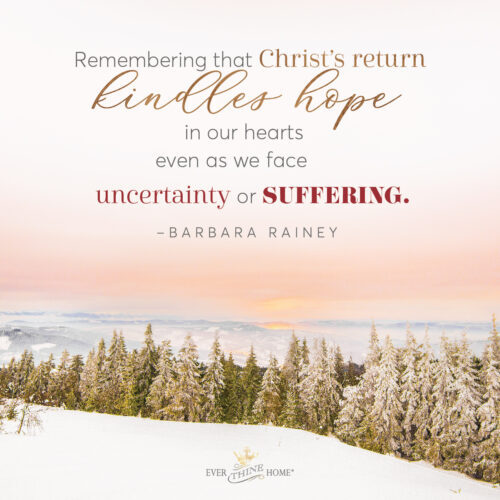
One suggestion is to remind one another of His return regularly. We do not know when, and we do not know how we will endure the hardship to come. But this we know is true: “… salvation is nearer to us now than when we first believed” (Romans 13:11).
Let’s focus on how near He is, not how long it’s been! Let’s anticipate the day as if it could be tomorrow. Let’s tell one another, “Maybe this is the year for Christ’s return.” Are you ready?
Choosing to focus on His promised return helps us not become rooted to earth. Remembering that His coming could be any day kindles hope in our hearts even as we face uncertainty, bad news, or suffering.
The bridesmaids in Jesus’s parable kept waiting, storing up extra oil in case the wait was longer than expected. Because they remained expectant they went to the store for more while there was time. As a result they were ready when the groom arrived.
Are you storing up oil? Oil in Scripture is often a metaphor for the Holy Spirit.
Are you inviting His work in your life so your life is ready for Jesus to see?
Will you ask Him to help you wait with hope, living today as if His appearing might be tonight?
His second coming is no less sure than His first arrival in a manger. He will not, however, come incognito this time, but “every eye will see Him,” (Revelation 1:7).
And when He returns He will judge the nations. And for those “who fear My name, the sun of righteousness shall rise with healing in its wings” (Malachi 4:2).
Maranatha!
Maybe this is the year of His return!
Come quickly, Lord Jesus!
To receive the rest of these pre-Christmas devotions
please enter your email and subscribe below.
We will email each devotion to you
The post Living in the “Now and Not Yet”: Nurturing Expectant Faith appeared first on Ever Thine Home.
December 30, 2024
Why My Christmas Lights Still Sparkle in January


I know Christmas is over, but most of my lights, my manger scene, and other Christ-focused decorations are still in place and will be through January. On dark winter days I like seeing my tiny twinkle lights brightening the cold outside. My décor reminds me that adoring God doesn’t end with the start of a new year!
But my lights will remind my heart to worship the newborn King!
And keeping Christmas décor in place, a practice of many believers in other cultures, continues the celebration of Christmas until Epiphany, January 6, the church calendar’s day for marking the arrival of the wise men.
But, like everyone else, I’m turning my focus to the New Year, anticipating all that God has ahead. And I’m staying mindful that looking ahead must be accompanied with looking above.
The words from the hymn, “O come let us adore Him” are not just for December. Adoring God is a yearly, monthly, daily, hourly attitude for us to remember, practice and lead our families in. As we step into the new of 2025, it’s equally important to sink our roots into what is old, unchanging, and eternal. I’m inviting you to join in this continual, regular worship of the One who came to save us.

Make 2025 the year that you resolve to daily consider the eternal faithfulness of the God who came near to you, knowing you will fail but He won’t. Make it a year when you make God a focus of your home. Deuteronomy 6:5-9 instructs:
You shall love the Lord your God with all your heart and with all your soul and with all your might. And these words that I command you today shall be on your heart. You shall teach them diligently to your children, and shall talk of them when you sit in your house, and when you walk by the way, and when you lie down, and when you rise. You shall bind them as a sign on your hand, and they shall be as frontlets between your eyes. You shall write them on the doorposts of your house and on your gates.
The study of His Word, the praising of His name, and the meditation on who He is does not end when the last pine needles are swept clean. So …
May this new year find you adoring God in every regular moment.
To receive the rest of these pre-Christmas devotionsplease enter your email and subscribe below.
We will email each devotion to you
The post Why My Christmas Lights Still Sparkle in January appeared first on Ever Thine Home.
December 23, 2024
When Christmas Came: Christmas Is About Hope


For God so loved the world, that he gave his only Son,
that whoever believes in him should not perish but have eternal life.
John 3:16
Christmas
is about Hope.
That we shall not perish.
Earthquakes
Floods
Storms
Wars
Persecutions
Famines
Death
But we who believe have hope.
All will be made alive!
All things will be made new!
All will see Him face to face,
the anchor
of our souls,
firm and secure.
In June of 2008 my sweet precious granddaughter, Molly Ann Mutz, was born full term with congestive heart failure, due to a serious malformation of blood vessels in her brain. Molly, who was beautiful and perfectly normal on the outside, lived only seven days.
What comfort was there for my daughter and her husband who were so quickly separated from their first-born child? Would they have joy again? More to the point: Would their heart-wrenching longing to see Molly again ever be quieted?
If Christmas had not come, the answer would be “No.” The end of life would be the end of everything.
But Christmas did come! Jesus was born! And He gave the world many promises: new life in Him today, forgiveness for our wrongs today, and the assurance of heaven where all things will be made new forever. “And I heard a loud voice from the throne saying, ‘Behold, the dwelling place of God is with man. He will dwell with them, and they will be His people, and God Himself will be with them as their God. He will wipe away every tear from their eyes, and death shall be no more, neither shall there be mourning nor crying nor pain any more, for the former things have passed away.’ And he who was seated on the throne said, ‘Behold, I am making all things new’” (Revelation 21:3-5).
These are words of hope to a young couple who had to plan a funeral instead of a homecoming. They are words of hope for me, for I wanted with all my heart to rescue my daughter and son-in-law from such pain. Though I had no power to rescue them, Jesus does. He alone can redeem our pain and turn great sorrow into joy.
This is the hope of Christmas—Immanuel, God with us—even when our hearts are broken and we feel we will perish in the flood of grief and loss and all that appears meaningless.
In The Brothers Karamazov, Fyodor Dostoevsky wrote, “I believe like a child that suffering will be healed and made up for, that all the humiliating absurdity of human contradictions will vanish like a pitiful mirage … that in the world’s finale, at the moment of eternal harmony, something so precious will come to pass that it will suffice for all hearts.”
Christmas is about hope. I, too, believe and have hope because Christmas has come.
To receive the rest of these pre-Christmas devotionsplease enter your email and subscribe below.
We will email each devotion to you
The post When Christmas Came: Christmas Is About Hope appeared first on Ever Thine Home.
December 17, 2024
When Christmas Came: Christmas Is About God

For God so loved the world, that he gave his only Son,
that whoever believes in him should not perish but have eternal life.
John 3:16
Christmas is all about God.
It was His stunning idea
in the beginning
before time began.
No one has seen the Father,
the all-seeing One,
the Three in One,
the Almighty,
the Alpha and the Omega,
who sees and hears and knows all,
yet loves His children.
With God nothing is impossible.
A virgin birth?
God of the universe in infant form?
A perfect life?
Nothing is too difficult for God.
This is the first of a nine-part series called “When Christmas Came.” It’s based on John 3:16, one of the most well-known verses in the Bible, and yet very few associate it with Christmas. In this series I will walk you through John 3:16 phrase by phrase for a new look at why we celebrate the incarnation of Jesus Christ.
I hope you will enjoy these pre-Christmas devotions and that on December 25 you’ll celebrate with a greater sense of awe and wonder. And before you move on to the next to-do item on your list, take another minute to reread this short poem about God’s involvement in Christmas.
The post When Christmas Came: Christmas Is About God appeared first on Ever Thine Home.
November 26, 2024
What God Taught Me When I Missed My Parent’s 25th Anniversary
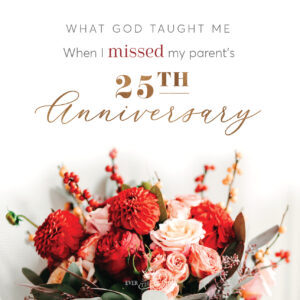
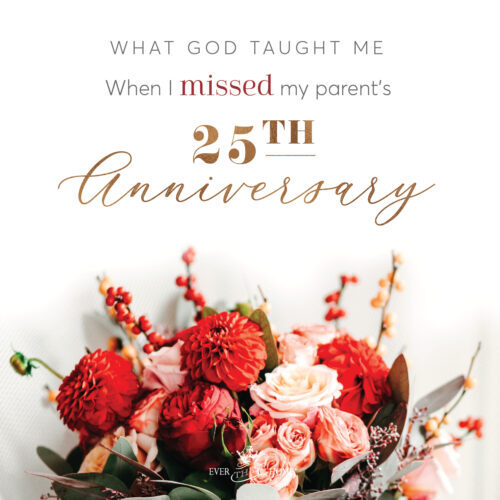
In the first year of our marriage, Dennis and I made an unintentional and yet very serious mistake, one that inflicted profound disappointment on two very important people. The rolling, repeating waves resulting from our mistake washed over onto us, too, and the drying out took longer than we ever imagined.
Like most newlyweds Dennis and I enjoyed spending all our time together. True to our season of life, we were mostly oblivious to other people outside our little bubble of two. Eleven months into our marriage our best friends from college called, inviting us to visit them in Oregon. From our new home in Colorado, driving to see the beauty of the Northwest sounded like a grand adventure and an opportunity to celebrate our first anniversary in memorable style.
The problem was those days coincided with my parents 25th anniversary. In Dennis’s family the celebration of anniversaries came and went without a mention, so his vote was to skip going to Houston for that weekend. I had a twinge of doubt, but to my knowledge nothing big was planned, so without calling to check I naively agreed.
On the eve of our departure for Oregon one of my younger brothers mentioned the family was all going to dinner. It sounded casual. But we found out afterward that it was not.
My parents perceived our decision as a very significant rejection.
In spite of my repeated apologies and attempts to make amends, we felt we were sinking in an undertow. My parents did not have a biblical understanding of forgiveness or conflict resolution, so the stew of disappointment and loss cooked too long. Living far away geographically made it difficult to spend more time with them to replace the bad memory with new good ones.
This was the first of many significant disappointments my parents experienced with my brothers and me, and us with them, as we four siblings became adults and began to live our own lives. My parents learned, as Dennis and I have, that the addition of spouses with different values, opinions, and life experiences can sometimes amplify the normal losses and disappointments of children becoming adults.
Over many years of watching families around the world I’ve been comforted knowing none are perfect. Not one family, even one that appears perfect on Christmas cards or in church, is exempt from the sin and its fallout that plague the planet.
Many of the most significant disappointments we experience in life occur in our families.
Here are two of the lessons I’ve learned that have helped me navigate these waters of family disappointment:
The first lesson is to practice 1 Peter 4:8, which tells us to “Above all, keep loving one another earnestly, since love covers a multitude of sins.” My family of origin avoided conflict at all costs, but we did eventually practice a love and grace like that of which Peter speaks. We forgave or moved on. Dennis and I practiced forgiving without a reciprocal response as Paul admonishes, “Be kind to one another, tenderhearted, forgiving one another, as God in Christ forgave you” (Ephesians 4:32). Jesus our example loved and forgave over and over as His last minutes of life on earth profoundly illustrate.
Of the two guilty criminals hanging on crosses on either side of Jesus, only one recognized His innocence. Only one recognized He was more than a mere human. And only one asked the crucified God for help.
The sinful guilty thief did not pray the sinner’s prayer first, nor did he confess his sins one by one in prayer before the Savior of the world. Simply and shockingly to our constant searching for formulas and rules, Jesus demonstrated God’s grace when He spoke words never forgotten since: “Today you will be with me in paradise” (Luke 23:43).
Could it be that Peter the apostle was remembering this profound act of grace toward an undeserving sinful man when he wrote so much about love in his first letter? Peter had a memory bank filled with images of grace like this one. How can we be “holy as He is holy” if we don’t forgive and show grace like Jesus did?
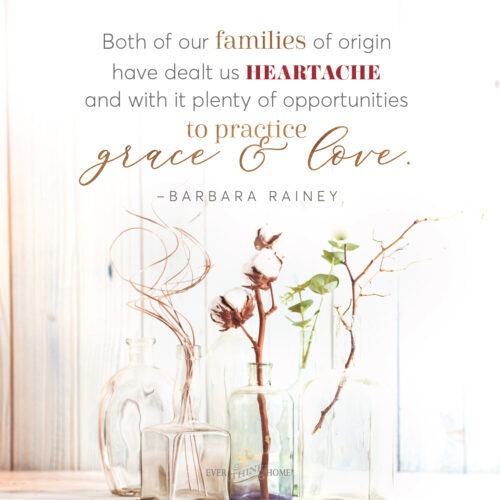
Both of our families of origin have dealt us heartache and with it plenty of opportunities to practice grace and love. Disappointment results because our love and grace and prayers have not resolved relational difficulties as we’d hoped. One reason is all relationships are two-way. Both sides must choose God’s way over self’s way. While we wait for God to work, we give thanks for the healthy relationships we experience with those who share our biblical worldview and values. We long for all, but we wait by faith.
The second lesson is to practice “benevolent detachment.” This is a concept John Eldridge writes about in his book, Take Back Your Life. It simply means caring for the many other people in your life and world but not becoming entrenched in what you can’t control or change.
With our adult children, for instance, we act in loving benevolent ways. We call and visit, send birthday gifts, attend as many important family events as possible, and we alternate holidays to get as much time with them as we can. We choose to listen to any woes they desire to share. We listen and empathize, but we also choose not to become emmeshed, worried, or afraid.
It’s much easier said than done, but we continually give our kids and their kids to God. He can work in ways we can’t. Doing this allows us to remain detached in a healthy way from their circumstances. And if they ask our advice we respond cautiously and conservatively.
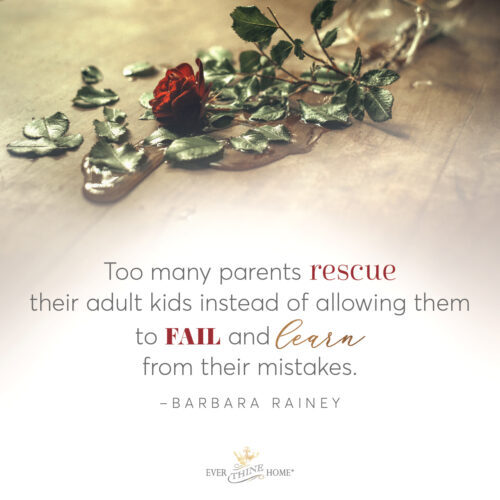
Too many parents rescue their adult kids instead of allowing them to fail and learn from their mistakes. (And too many parents raise their children without allowing consequences for their behavior, fearing they’ll damage their little hearts with discipline.) God is not afraid to let us crash and burn and learn. He can heal all wounds. We are to imitate Him, not the world.
It sounds unloving and uncaring to “let go” of other people’s concerns. And I’m not saying you should practice indifference from the cares of your family. There will be times when it’s appropriate to offer help. But God didn’t make us to carry the cares of the world or even the cares of a small part of the world called family. We can’t save anyone nor are we supposed to. It’s God’s job to save and carry the world. Remember, “Cast all your anxiety on him because he cares for you” (1 Peter 5:7, NIV) and “Come to me all who labor and are heavy laden, and I will give you rest” (Matthew 11:28).
The benefit of benevolent detachment is also two-way. Parents can love and care and be involved as requested and have time to enjoy the later years of their lives as God leads. Adult kids can learn from their mistakes and grow up into role models for their own children to imitate. Much of the reason for our many family disappointments is we expect what is not possible on earth—peace with all and no conflict with any. Though we love our grown children and always will, we are not responsible for them anymore.
Family disappointment will last until Jesus comes back. Until then our call is to practice John’s admonition, “Love covers a multitude of sins” and benevolent detachment which cares as it gives them all to God’s better care.
The post What God Taught Me When I Missed My Parent’s 25th Anniversary appeared first on Ever Thine Home.
Barbara Rainey's Blog
- Barbara Rainey's profile
- 24 followers



